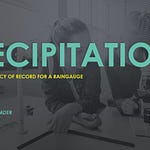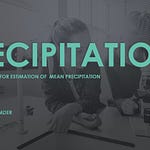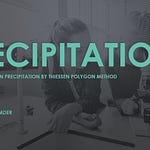Whenever you're ready, here are three great ways we can support you:
Promote yourself or your organisation by sponsoring this newsletter — we reach an engaged audience with a 30–40% weekly open rate. Leave a message or contact me directly at mrinmoy@majumdar.info.
Upgrade to a paid membership and unlock exclusive insights and benefits. Click here. (Click here to pay in USD)
Subscribe to the HydroGeek Podcast on YouTube and stay connected with the latest in hydroinformatics and beyond. Click here.
In a world where technology is advancing at lightning speed, traditional domains like water resource management are being redefined. One emerging specialization at the heart of this evolution is hydroinformatics—a field that blends computational science with water-related challenges to create innovative, data-driven solutions.
Yet, hydroinformatics remains unfamiliar to many, even within engineering circles. So, what exactly is this field, and why is it gaining such momentum?
What Is Hydroinformatics?
Hydroinformatics is the application of advanced information technologies—such as artificial intelligence (AI), machine learning (ML), data science, the Internet of Things (IoT), and integrated communication technologies (ICTs)—to solve problems related to water systems. These problems can range from flood modeling and irrigation efficiency to hydropower optimization and climate resilience.
Much like geoinformatics or environmental informatics, hydroinformatics focuses on a domain—in this case, water—and enhances it with data-centric technologies.
Hydroinformatics vs. Hydrology: Clearing the Confusion
A common misunderstanding arises from the shared prefix “hydro.” Many assume hydroinformatics is simply a sub-field of hydrology or water resources. But the key difference lies in the suffix—informatics.
Hydrology is concerned with the behavior and movement of water in the environment—like rainfall, runoff, infiltration, and groundwater dynamics.
Hydroinformatics, on the other hand, is centered on how computational tools and data-driven methods can be applied to water-related problems.
The distinction is important. A hydrologist may use informatics, but their core expertise lies in hydrological science. A hydroinformatics engineer, by contrast, is primarily driven by informatics, using it to tackle challenges in hydrology, hydraulics, hydropower, and more.
The Power of Collaboration—and Specialization
In today’s world, many civil engineers are learning programming to apply computational tools to their field. While commendable, a powerful synergy occurs when domain experts and tech specialists collaborate. A civil engineer and a programmer working together can often solve problems faster and more effectively than either could alone.
This collaborative model is mirrored in hydroinformatics. An ideal hydroinformatics engineer possesses enough knowledge of water science to understand the problem and enough computational expertise to solve it. However, their strength lies in integrating these domains—not necessarily mastering both to the same depth.
A Truly Multidisciplinary Field
Hydroinformatics spans civil, mechanical, electrical, agricultural, and computer science disciplines. Whether dealing with hydrology (civil), hydraulics (mechanical), or hydropower systems (electrical), informatics has a transformative role to play.
This makes hydroinformatics inherently multidisciplinary. It requires not only technical knowledge but also the ability to collaborate across fields and communicate complex ideas with clarity.
Why the World Needs Hydroinformatics
As global water challenges intensify—due to climate change, urbanization, and increasing demand—traditional methods are no longer sufficient. The integration of real-time data, smart sensors, predictive models, and decision-support systems is vital. Hydroinformatics equips engineers and researchers with the tools to meet these evolving demands.
In short, hydroinformatics is not a trend—it’s a necessity. And it offers a promising pathway for the next generation of water professionals to make impactful, innovative contributions.
Enjoy seven days of free access to this post, no strings attached! Afterwards, unlock unlimited access and join the community for just Rs.600/= (or choose to pay in dollars). Upgrade now by clicking here and never miss out on valuable insights!": Click here and pay Rs.600/=( or buy in dollars)
You may also like :
3)Call for Papers: Inviting you to write for this newsletter
4)International Journal of HydroClimatic Engineering: Call for Papers
5)Virtual Forum on Water and Power Engineering 2025: Call for Paper
6)Ebook : 53 Ideas of Research Projects in Artificial Intelligence and Water Resource Development
7)Baipatra Very Short Term Course on Hydroinformatics Newsletter
8)Bio Inspired Optimization Technique Bundle Membership
9)How to open your own home page?(AD)
10)Podcast : Hydrology for Beginners
11)Learn in One Page : Artificial Intelligence and Water Resource Development
13)Introduction to Model Development for Prediction, Simulation and Optimization
14)50 Project Ideas on MCDM and GIS
15)600 Interview Questions on Water Resources
16)Use AI to build your website(AD)











